Economist Emily Oster Wants Parents to Relax More—and Look at the Data
May 10, 2019 | Filed in: Woman of the Week
When economist Emily Oster was expecting her first child, she was so dismayed by the lack of data behind conventional thinking about pregnancy that she decided to make a study of the subject herself. The result was Expecting Better, a book analyzing medical research on pregnancy to help expecting parents make well-informed decisions—and, hopefully, freak out less. Four years later, Oster, who is a professor of economics at Brown University, has two kids and a second book, Cribsheet, which debunks myths about parenting young children. Here, she talks about compartmentalizing her jobs, parenting advice from strangers, and the three things on which she spends her time.
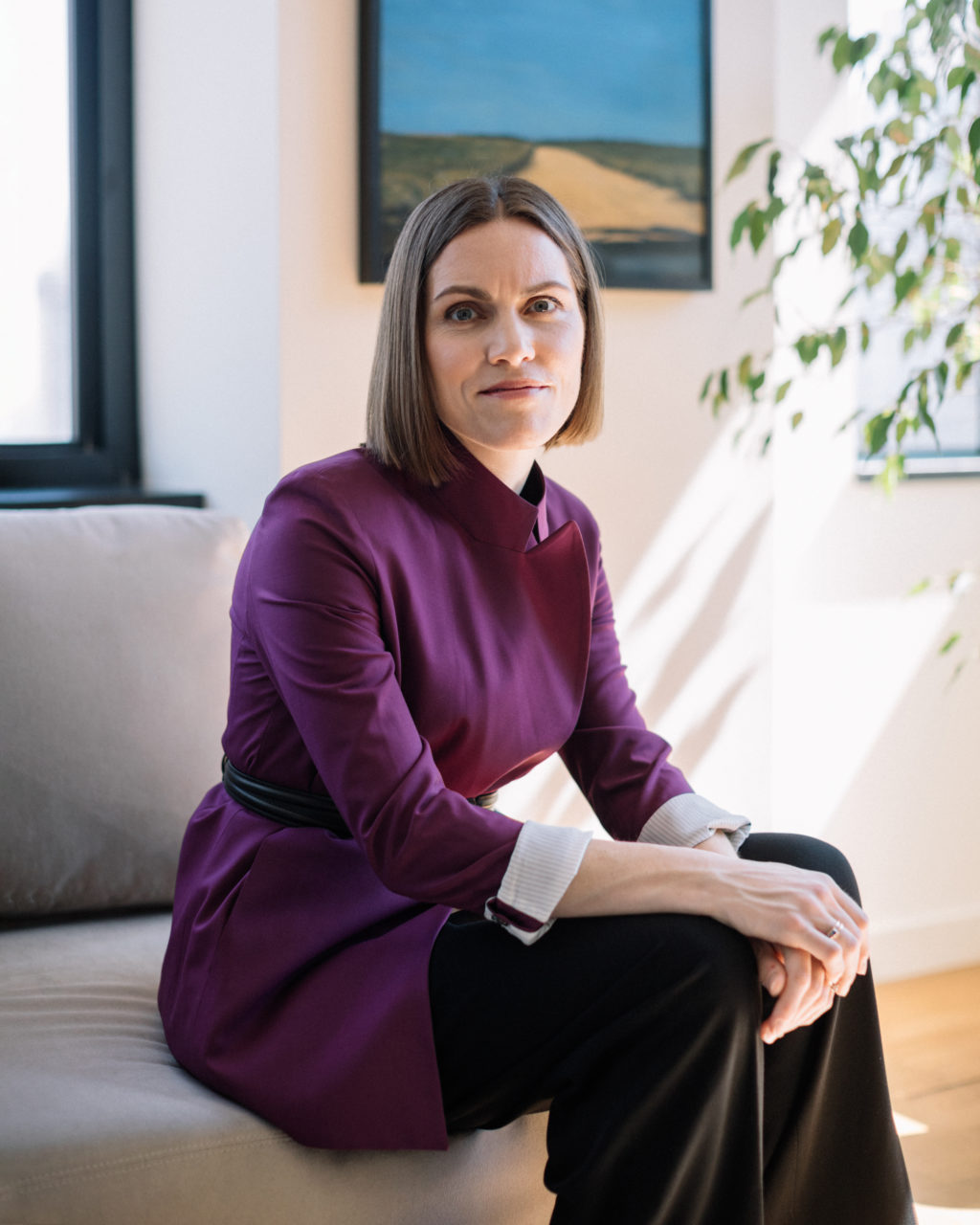
Emily wears the Oliver jacket, the Tinsley trouser, the Peggy top, and the Notched belt.
I ALWAYS WANTED TO GET A PH.D. My parents were economists, and while I didn’t think I wanted to go into the same field at first, I had an idea that I was headed toward academia. I applied to graduate school when I was an undergraduate at Harvard, but I did not get into the programs I wanted. So I decided to take a job at an economic consulting firm and see how it went. The job was great, but it also confirmed to me that I wasn’t cut out for that type of work. So I applied to graduate school again. I had written more papers by then, so I got in.
WHEN I WAS PREGNANT WITH MY FIRST CHILD, the decisions that loomed largest to me were the medical ones, like whether to get certain prenatal screenings. But the numbers and decision processes that were presented to me were totally flawed. They didn’t make any sense. I was like, “Why can’t I get what I need to make these enormously important medical decisions?” As a person who looks at data all the time, I found this especially frustrating.
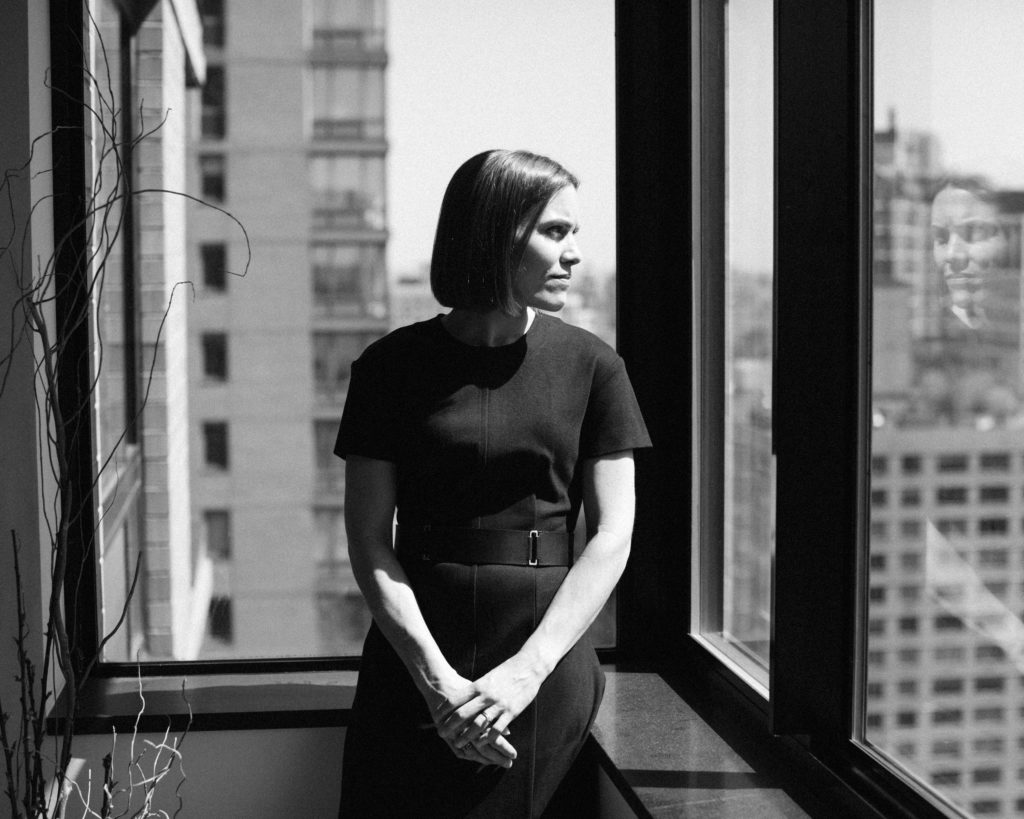
Emily wears the Coretta dress and the Double Rectangle belt.
THE INFORMATION THAT YOU RECEIVE ABOUT PREGNANCY and parenthood can be overwhelming and conflicting. So much of what you read and hear is black and white: “You have to do this, and you shouldn’t do that, and you can’t eat sushi for reasons that are unclear.” When I wrote Expecting Better, I wanted to provide a resource that says, “There are a lot of different good choices and here are the trade-offs for each one.” As it turns out, the data shows that a lot of things are not as important as you might have thought, and that gives people a bit of a break. I hope it helps some people relax more.
YOU WANT TO FEEL CONFIDENT IN THE CHOICES that you make as a parent, and you’re going to feel frustrated if you don’t have a framework for making decisions. My new book, Cribsheet, is intended to provide that framework, and while it might require you to set your emotions aside at times, maybe you will feel more secure in the choices you make in the end. Because I approach information as someone who spends her time looking at data, my books are more meta-analysis and less memoir. That sets them apart from a lot of parenting advice books out there.
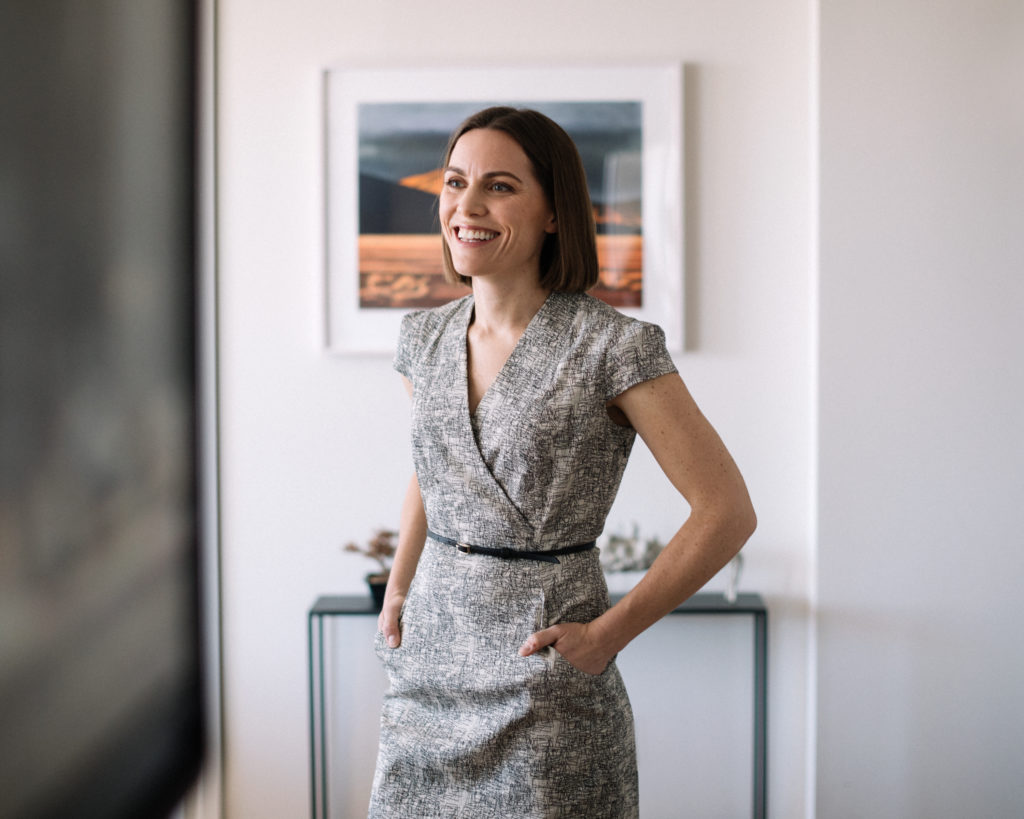
Emily wears the Felisa dress.
PEOPLE LIKE TO HAVE RULES, especially with parenting. For example, most people are told that the first food you should give your kid is rice cereal. There’s a set of rules about the order of introducing foods. But there’s no evidence for why those rules are better than other perfectly fine ways to do the same thing. People like to have guidance and a system. This is just as good a system as any other, but it doesn’t mean that the other ones are wrong.
WHEN YOU RUN INTO TRICKY TOPICS, parenting rules are particularly complicated. For instance, lots of people say, “Co-sleeping is going to kill your baby,” and then another group says, “Co-sleeping is the only way to form a secure attachment with your baby and people have been doing it for thousands of years.” There’s no middle ground. You could say the rule is don’t co-sleep, which is more or less what people go with. But then you run into another parent at the park who’s like, “I can’t believe you’re doing this thing to your baby. Why are you such a monster?” These are tough decisions and I don’t pretend to have all the answers.
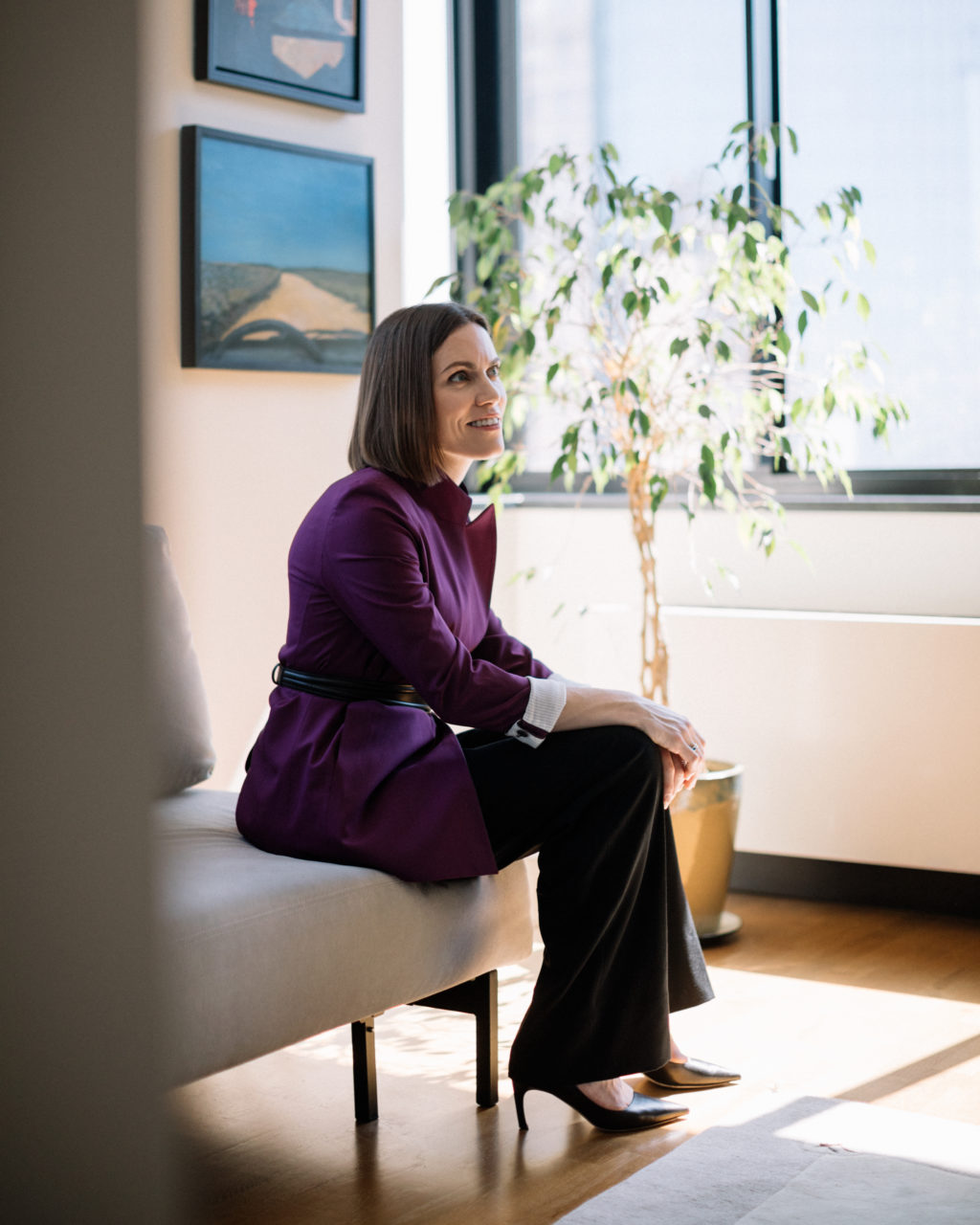
Emily wears the Oliver jacket, the Tinsley trouser, the Peggy top, the Notched belt, and the Ginger pumps.
FOR EVERY PARENT there are many moments when you feel other people are judging you. Sometimes that person is your mom. Other times it’s the lady at the coffee shop who is like, “Why isn’t your kid wearing more of a sweater?” And really, why is that her business? Maybe I didn’t feel like putting him in a sweater or he doesn’t like sweaters. But when you write books that give parenting advice, it does open you up to an additional level of judgment. Like, when I’m at the airport and my kid is licking the escalator, it’s like, “Oh yeah, I’m an expert on parenting!” My philosophy is, I’m not going to make all the same choices as everyone else, but I feel good about my choices. I think we all want to know that we’ve made the right choices for us, or at least the best ones we could.
I’M A PERSON WHO LIKES TO CONTROL THINGS. And it’s particularly hard not to have control of something that you care so much about—like another person who doesn’t want to sleep or is crying a lot. When things aren’t going the way you want with your kids, especially at the beginning, it’s easy to try to look for patterns to convince yourself that you have control. Like, “Oh, she slept for four hours and right before that I nursed for 13 minutes on one side and 12 minutes on the other side, and then I put her hat on at this different angle where only one ear was out. Let’s do that again!” But really there might be no pattern at all. Sometimes you just have to be like, “You know what? There’s nothing I can do about this.” When I want my kids to behave a certain way or do certain things, I have to remind myself, my kids are not me.
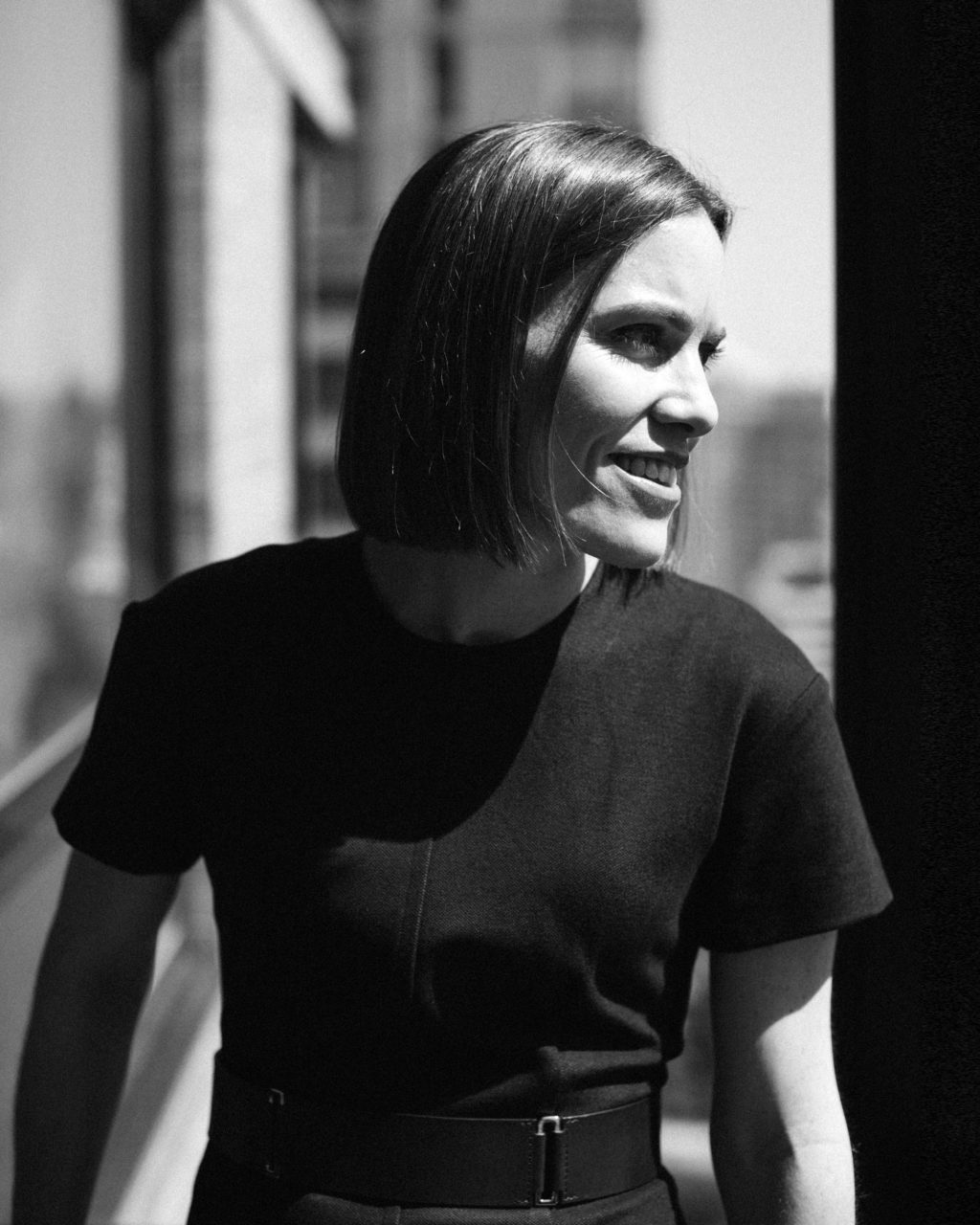
Emily wears the Coretta dress and the Double Rectangle belt.
MOST OF MY RESEARCH IS VERY DIFFERENT from my book topics and balancing the two has had its ups and downs. But there is synergy in some cases. In the last few years, I looked at economic research methods, like econometrics. Much of that was driven by issues that arose in the medical studies I read for my books. Doing my economics research is totally different from working on a book. I really like the writing part. It feels almost like a hobby, which isn’t to say I don’t take it seriously. I do it very early in the morning while everybody else is asleep. I get up at 5 a.m. and I try to write until 7 a.m.
WHEN I’M NOT DOING THESE TWO JOBS, I play with my kids. I would say that I do three things: I work on the book, I work at my job, and I hang out with my kids. And that’s it. I think it’s a mistake to suggest that you can have it all. I have a lot of things but I do not have a social life. I have close friends, but we do not go out and hang out together except in very rare circumstances. At this stage in my life, that works for me, and I think my friends understand because many of them have the same issue. You have to recognize that there’s a limited number of hours in the day. I would say I’m pretty happy with the balance right now. Yes, it would be great on Sunday mornings to get to routinely sit for an hour with a cup of coffee and a book, but that’s a pretty minor thing.
SPEAKING OF KEEPING THINGS SIMPLE, I only wear M.M.LaFleur clothes. I wear the Oshima pants all the time because they’re not complicated. My mom is very into clothing and she’s constantly trying to get me to wear things like jackets with giant flowers on them. But I just want to wear clothes that are going to fit me and look nice and go together. I don’t want to spend a lot of time standing in front of the closet thinking, “Is today a giant flower day?” There are very few situations where a sheath dress is not going to work.
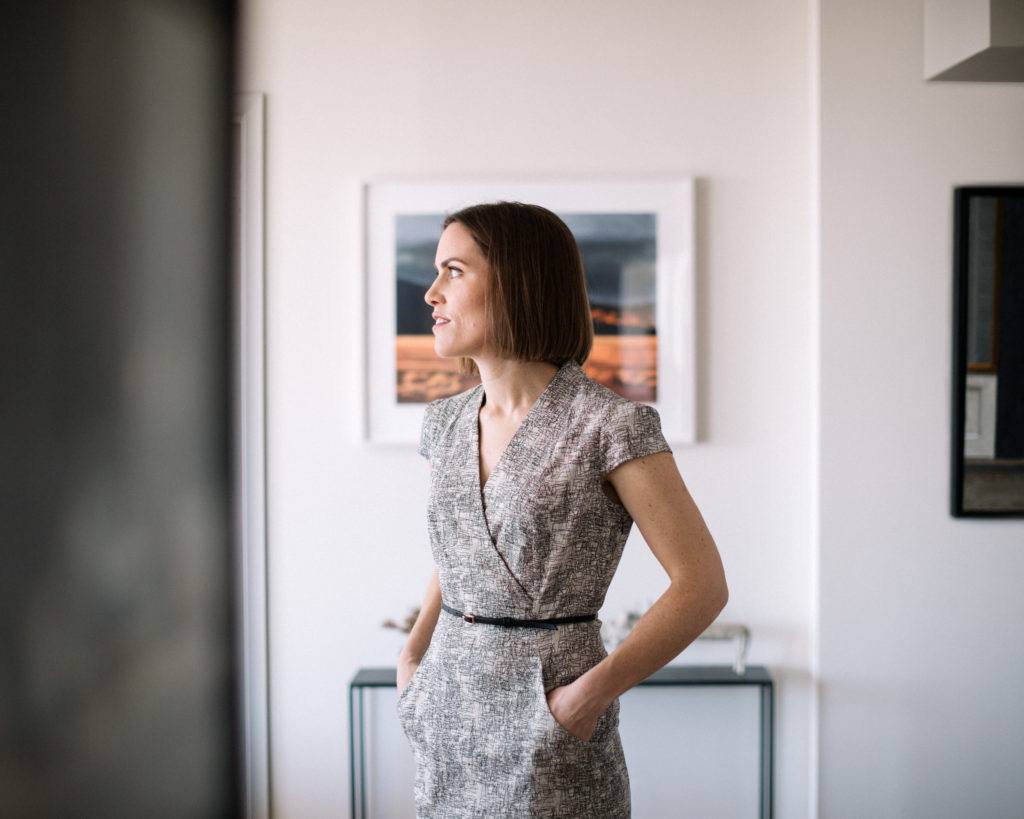
Emily wears the Felisa dress.
Photographs by Rich Gilligan. Styling by Chris Walsh.





